Vancouver, British Columbia, June 24, 2024 – Kenorland Minerals Ltd. (TSXV: KLD) (OTCQX: KLDCF) (FSE: 3WQ0) (“Kenorland” or the “Company”) is pleased to announce that it has commenced multiple regional-scale surface exploration programs at its 100% owned South Uchi, Western Wabigoon, Flora, Algoman and Stormy Lake Projects (collectively, the “Projects”), covering approximately 331,000 hectares of mineral tenure in the Red Lake District and Wabigoon subprovince in Northwestern Ontario.
Zach Flood, President and CEO, states, “The scale of grassroots exploration which is now underway in Ontario cannot be understated. Collectively, these campaigns will cover over 331,000 hectares of ground, within highly prospective greenstone belts, and in areas which have seen limited modern systematic exploration. In addition to the multiple first-pass, property-wide geochemical surveys covering new projects, we are carrying out detailed prospecting and HMC (heavy mineral concentrate) till surveys at South Uchi, following up on two very significant gold-in-till anomalies generated from previous regional surveys. This strategy will allow us to continue developing a strong pipeline of exploration targets with real potential for new discoveries.”
Figure 1. Map of the Ontario Projects
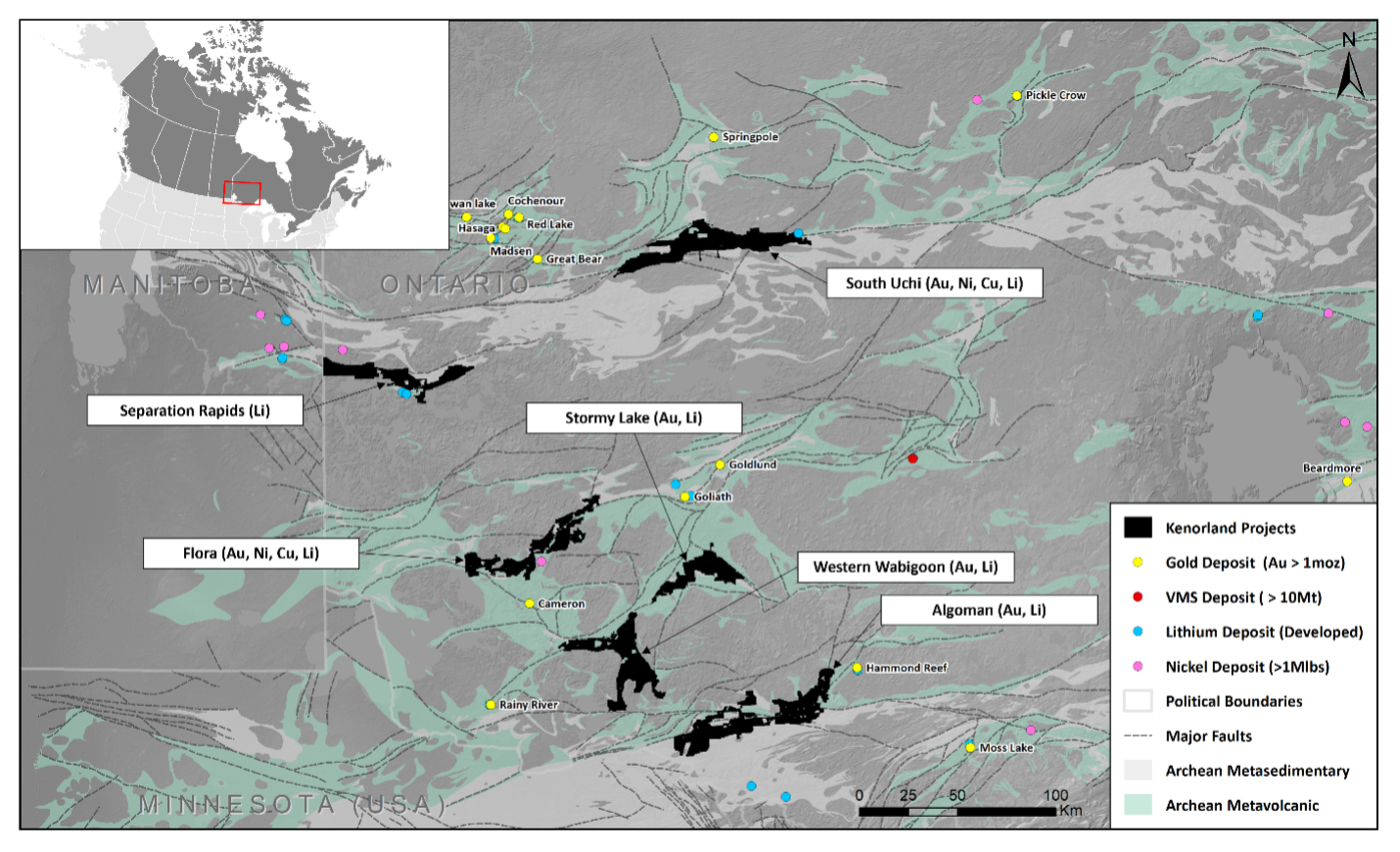
South Uchi Project
Exploration planned for the summer of 2024 includes detailed mapping and prospecting within the gold-in-till dispersal plumes generated from previously completed large-scale geochemical surveys (see press release dated February 28, 2024). The program will include systematic prospecting over the Papaonga target and Target B areas, along with a detailed heavy mineral concentrate (HMC) till survey over the Papaonga target for gold grain counts and analysis (see figure 2). The objective of the summer field program is to define drill targets for testing in 2025. The budget for the planned program is approximately C$550,000.
Figure 2. South Uchi Regional Till Geochemistry and Target Areas
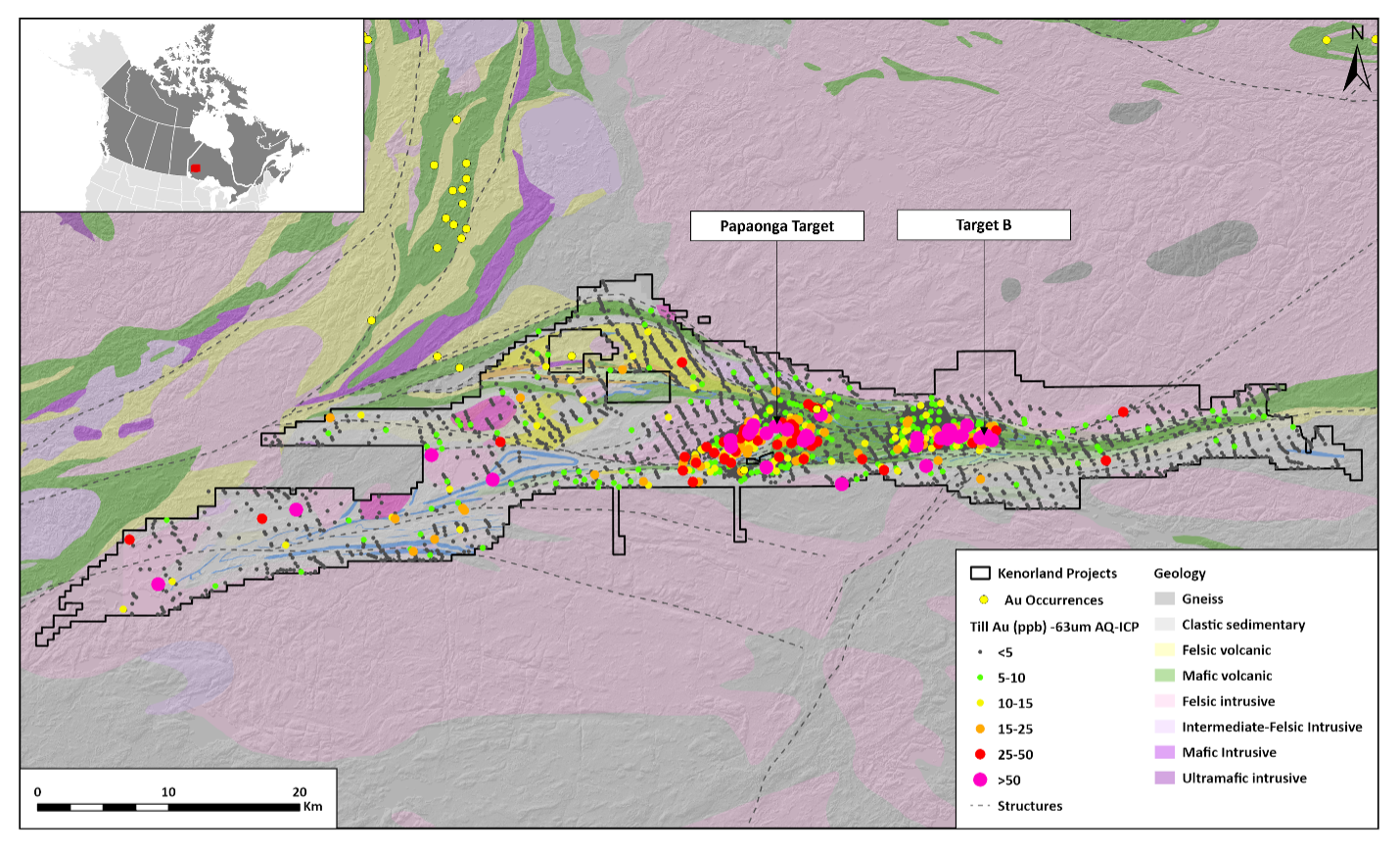
The South Uchi Project was first identified and staked by Kenorland in 2021, based on the prospectivity to host significant gold systems. The project covers a portion of Confederation Assemblage volcanic rocks, as well as the structural boundary between the volcanic-dominated Uchi geological subprovince to the north and the sedimentary-dominated English River subprovince to the south. Multiple major east-west striking shear zones associated with the subprovince boundary transect the project along its 90km strike-length. Deformation associated with these structures has resulted in zones of strong shearing, alteration, and folding of the metavolcanic-clastic and metasedimentary-iron formation stratigraphy, which are favorable settings for orogenic gold mineralisation.
Flora Project
The first-pass 2024 surface exploration program includes a property-wide glacial till geochemical survey, including the collection of approximately 2,200 samples (1000m x 200m sample spacing) covering the 57,321-hectare property. In addition, approximately 250 detailed till samples (100m x 100m sample spacing) and 35 HMC/MDMC till for gold grain and spodumene counts will be collected to investigate an undocumented spodumene occurrence discovered in 2023 by a local prospector. The budget for the planned program is approximately C$570,000.
Figure 3. Flora Project Geology and Sample Locations
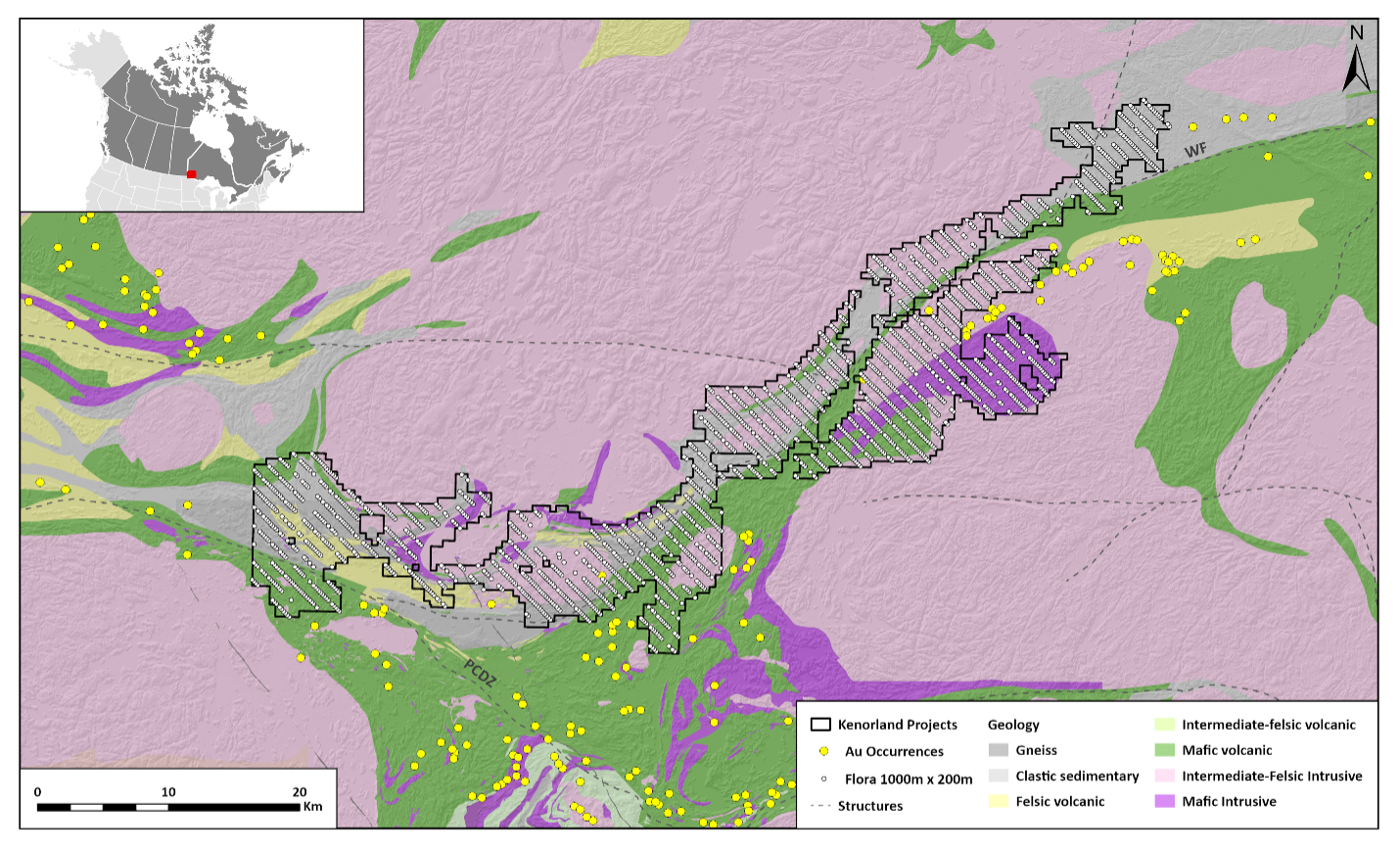
The property is located within the western Wabigoon subprovince of the Archean Superior Province. Within the project area, a variety of geological environments has potential of hosting different deposit types including orogenic gold, Ni-Cu sulphide, Li-Cs-Ta (LCT) pegmatite and VMS-style mineralisation. The Warclub assemblage, a belt of predominantly metasedimentary and felsic metavolcanic rocks locally hosting chert-magnetite iron formation underlies the northwestern portion of the project. The major Wabigoon Fault (WF) transects the 80km strike-length of the property and juxtaposes Warclub assemblage rocks against the Populus Lake Group mafic volcanics-ultramafic intrusions to the south. Mineralisation styles within the region include orogenic Au deposits such as the Cameron deposit 15km to the south along the northwest trending Pipestone-Cameron Deformation Zone (PCDZ) and the Goliath deposit 50km to the northeast along the Wabigoon Fault, and magmatic Ni-Cu sulphide deposits such as the Kenbridge deposit 3km east of the property. Evolved muscovite bearing granites are also mapped within the northeast portions of the property, approximately 30km from the peraluminous Ghost Lake batholith, which is spatially associated with several LCT pegmatite occurrences.
Western Wabigoon Project
The 2024 surface exploration program includes a regional, property-wide glacial till geochemical survey. The first-pass campaign will include the collection of approximately 2,600 till samples (1000m x 200m sample spacing), to systematically screen the entire 64,531-hectare property which has seen limited historical exploration. A second phase program for follow-up exploration within the 2024 field season will be determined based on results. The budget for the planned program is approximately C$640,000.
Figure 4. Western Wabigoon Geology and Sample Locations
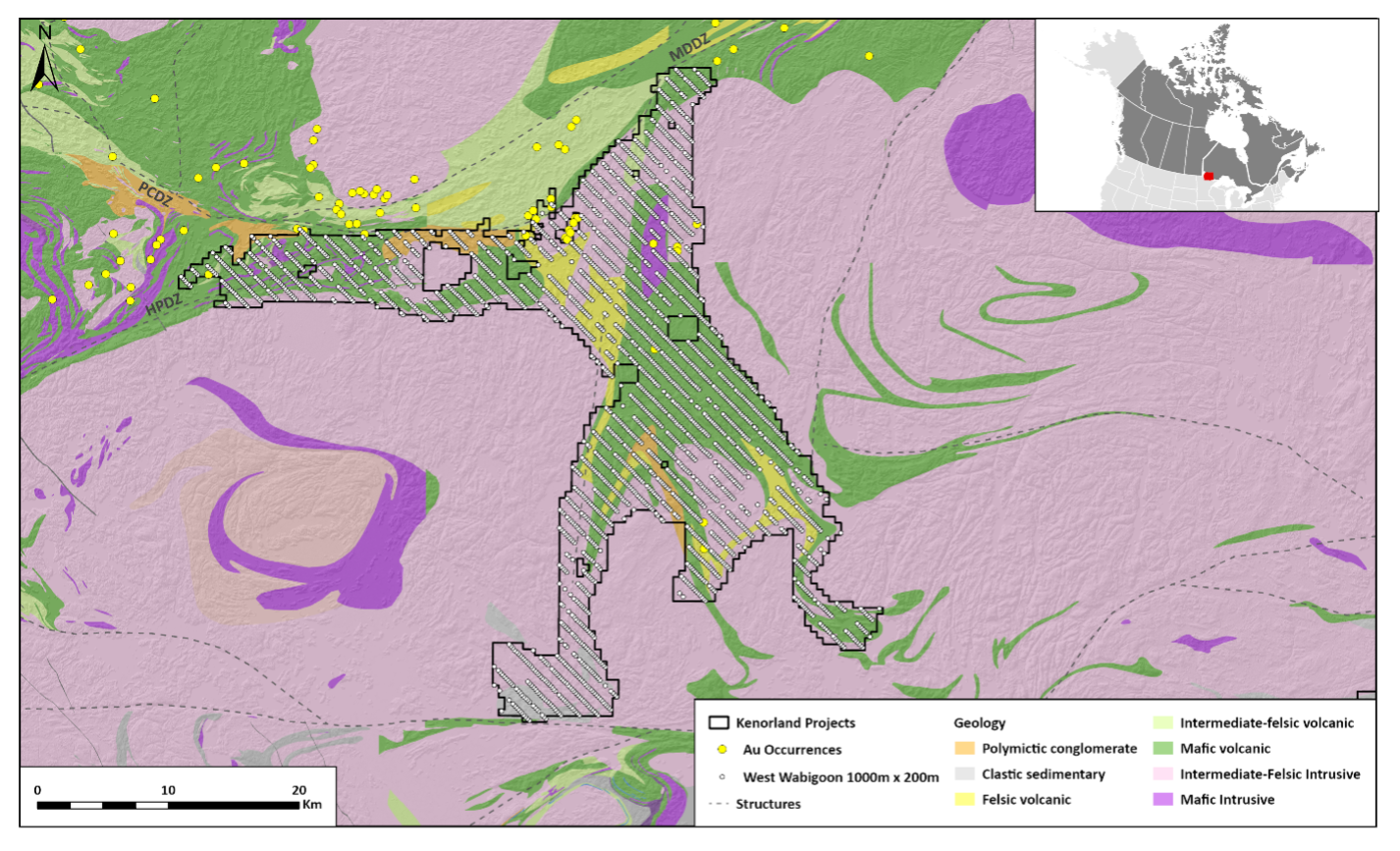
Within the northern portion of the project area is the intersection of the regional Pipestone-Cameron Deformation Zone (PCDZ), the Manitou-Dinorwic Deformation Zone (MDDZ), and the Helena-Pipestone Deformation Zone (HPDZ). The PCDZ hosts the Cameron orogenic Au deposit 30km to the northwest of the property, and the HPDZ hosts the Rainy River deposit 50km to the southwest. These high strain structural corridors host a number of additional gold showings and deposits, usually associated iron carbonate veins, altered shear zones and porphyry dykes. The southern handle of greenstone belt has seen very little historical exploration and hosts gabbroic sills, porphyry dykes, VMS-style zinc occurrences and pegmatite dykes. Several base metal VMS occurrences are located within the southern portion of the project, and anomalous Li, Cs and Rb in lake sediment geochemistry are spatially coincident with pegmatite dykes noted in regional mapping.
Algoman Project
The first-pass 2024 surface exploration program includes a regional glacial till geochemical survey targeting orogenic gold and LCT pegmatite mineral systems. The 2024 survey will include the collection of approximately 3,200 till samples at 1000m x 200m spacing, covering the 88,756-hectare property. Several known gold occurrences are located within the Algoman project which have seen limited exploration at the regional scale, and Kenorland’s exploration strategy will effectively screen the project concealed by glacial till overburden. A second phase program for follow-up exploration within the 2024 field will be determined based on results. The budget for the planned program is approximately C$765,000.
Figure 5. Algoman Geology and Sample Locations
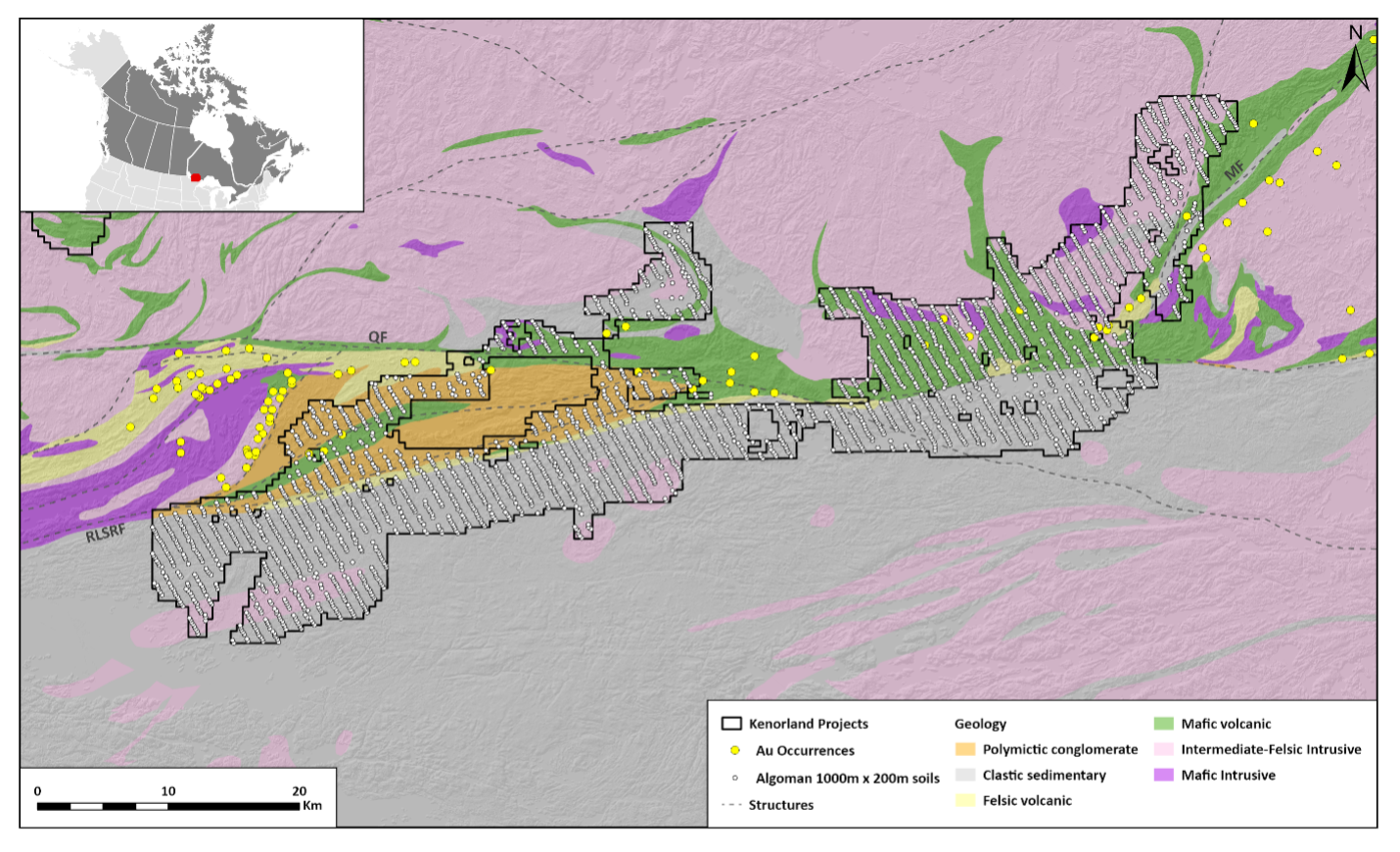
The project area encompasses 75km strike-length of the structural boundary between the western Wabigoon and Marmion geological subprovinces to the north, and the Quetico subprovince to the south. The western Wabigoon and Marmion subprovinces include volcanic and metasedimentary greenstone belts and surrounding felsic plutonic batholiths transected by several major east-west to northeast striking deformation zones including the Quetico Fault (QF) and the Marmion Fault (MF), host to the Hammond Reef deposit located 15km to the northeast. The Rainy Lake-Seine River Fault system (RLSRF), a major east-west trending deformation zone juxtaposes the Quetico subprovince in the south, dominated by sedimentary gneissic rocks and felsic plutonic rocks.
The project area has potential for several mineralisation styles including vein hosted to disseminated sulphide orogenic gold associated with the regional deformation zones, similar to the nearby significant deposits including Hammond Reef, and vein systems of the Mine Centre to the west. The RLSRF and Quetico subprovince are prospective for LCT pegmatite mineralisation, a regional which has seen recent increased exploration activity associated with evolved granite plutons within the subprovince.
Stormy Lake Project
The phase one 2024 surface exploration program includes a LIDAR survey, surficial geology interpretation, and a regional glacial till geochemical survey including the collection of approximately 2,400 first-pass, 500m x 200m spaced till samples covering the 37,028-hectare property. The Stormy Lake Project is comprised of two option agreements to acquire 100% interest in the properties (see press release dated January 18, 2024), as well contiguous land tenure currently 100% owned by Kenorland. The budget for the planned program is approximately C$677,000.
Figure 6. Stormy Lake Geology and Sample Locations
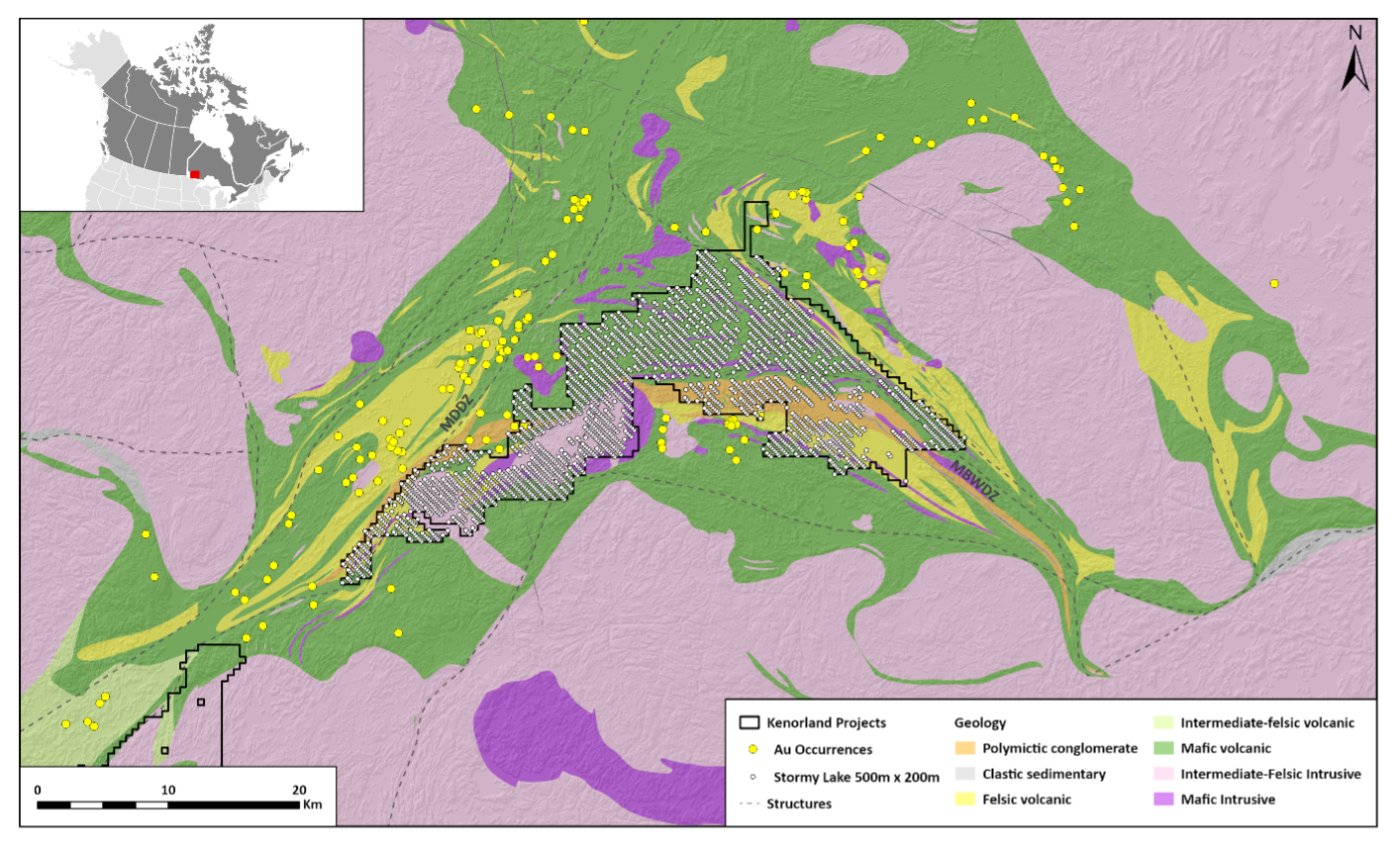
Located within in the Manitou-Stormy Lakes greenstone belt of the western Wabigoon geological subprovince, the project encompasses approximately 40km strike-length of the Mosher Bay-Washeibemaga Deformation Zone (MBWDZ), a major, crustal scale east trending deformation zone which intersects with the northeast striking Manitou-Dinorwic deformation zone (MDDZ) along the western margin of the project area. The MBWDZ is marked by the syn-orogenic, Timiskaming-like polymictic conglomerate to coarse sedimentary and volcanic rocks of the Stormy Lake group, that juxtaposes older mafic volcanic rocks of the Boyer Lake group to the north and the Wapageisi group to the south. The regional deformation zones host a number of orogenic gold occurrences throughout the region, however the MBWDZ covered by the project has seen very limited historical exploration compared to the MDDZ.
Separation Rapids Project
Kenorland also announces that Double O Seven Resources Ltd. (“Double O”) has elected not to proceed with an option payment on the Separation Rapids Project and that the option agreement between Double O and Kenorland dated March 28, 2022 is terminated. Kenorland will remain the 100% owner of the Separation Rapids Project.
The Separation Lithium Project covers approximately 80 kilometers of the contact between the English River and Winnipeg River geologic subprovinces. This boundary is spatially associated with the Tanco Li-Cs-Ta pegmatite deposit in Manitoba, as well as the Big Whopper Li pegmatite in the Separation Rapids area. The presence of these two significant Li pegmatite deposits suggests that the entire English River – Winnipeg River domain contact is prospective for additional Li pegmatite mineralisation.
Qualified Person
Mr. Janek Wozniewski, B.Sc., P.Geo. (EGBC #172781, APEGS #77522, EGMB #48045, PGO #3824), a “Qualified Person” under National Instrument 43-101, has reviewed and approved the scientific and technical information in this press release.
About Kenorland Minerals Ltd.
Kenorland Minerals Ltd. (TSXV: KLD) is a well-financed mineral exploration company focused on project generation and early-stage exploration in North America. Kenorland’s exploration strategy is to advance greenfields projects through systematic, property-wide, phased exploration surveys financed primarily through exploration partnerships including option to joint venture agreements. Kenorland holds a 4% net smelter return royalty on the Frotet Project in Quebec which is owned by Sumitomo Metal Mining Canada Ltd. The Frotet Project hosts the Regnault gold system, a greenfields discovery made by Kenorland and Sumitomo Metal Mining Canada Ltd. in 2020. Kenorland is based in Vancouver, British Columbia, Canada.
Further information can be found on the Company’s website www.kenorlandminerals.com
On behalf of the Board of Directors,
Zach Flood
President, CEO & Director
For further information, please contact:
Alex Muir, CFA
Investor Relations Manager
Tel +1 604 568 6005
info@kenorlandminerals.com
Cautionary Statement Regarding Forward Looking Statements
This news release contains forward-looking statements and forward-looking information (together, "forward-looking statements") within the meaning of applicable securities laws. All statements, other than statements of historical facts, are forward-looking statements. Generally, forward-looking statements can be identified by the use of terminology such as "plans", "expects', "estimates", "intends", "anticipates", "believes" or variations of such words, or statements that certain actions, events or results "may", "could", "would", "might", "will be taken", "occur" or "be achieved". Forward looking statements involve risks, uncertainties and other factors disclosed under the heading “Risk Factors” and elsewhere in the Company’s filings with Canadian securities regulators, that could cause actual results, performance, prospects and opportunities to differ materially from those expressed or implied by such forward-looking statements. Although the Company believes that the assumptions and factors used in preparing these forward-looking statements are reasonable based upon the information currently available to management as of the date hereof, actual results and developments may differ materially from those contemplated by these statements. Readers are therefore cautioned not to place undue reliance on these statements, which only apply as of the date of this news release, and no assurance can be given that such events will occur in the disclosed times frames or at all. Except where required by applicable law, the Company disclaims any intention or obligation to update or revise any forward-looking statement, whether as a result of new information, future events or otherwise.
Neither the TSX Venture Exchange nor its Regulation Services Provider (as that term is defined in the policies of the TSX Venture Exchange) accepts responsibility for the adequacy or accuracy of this release.






